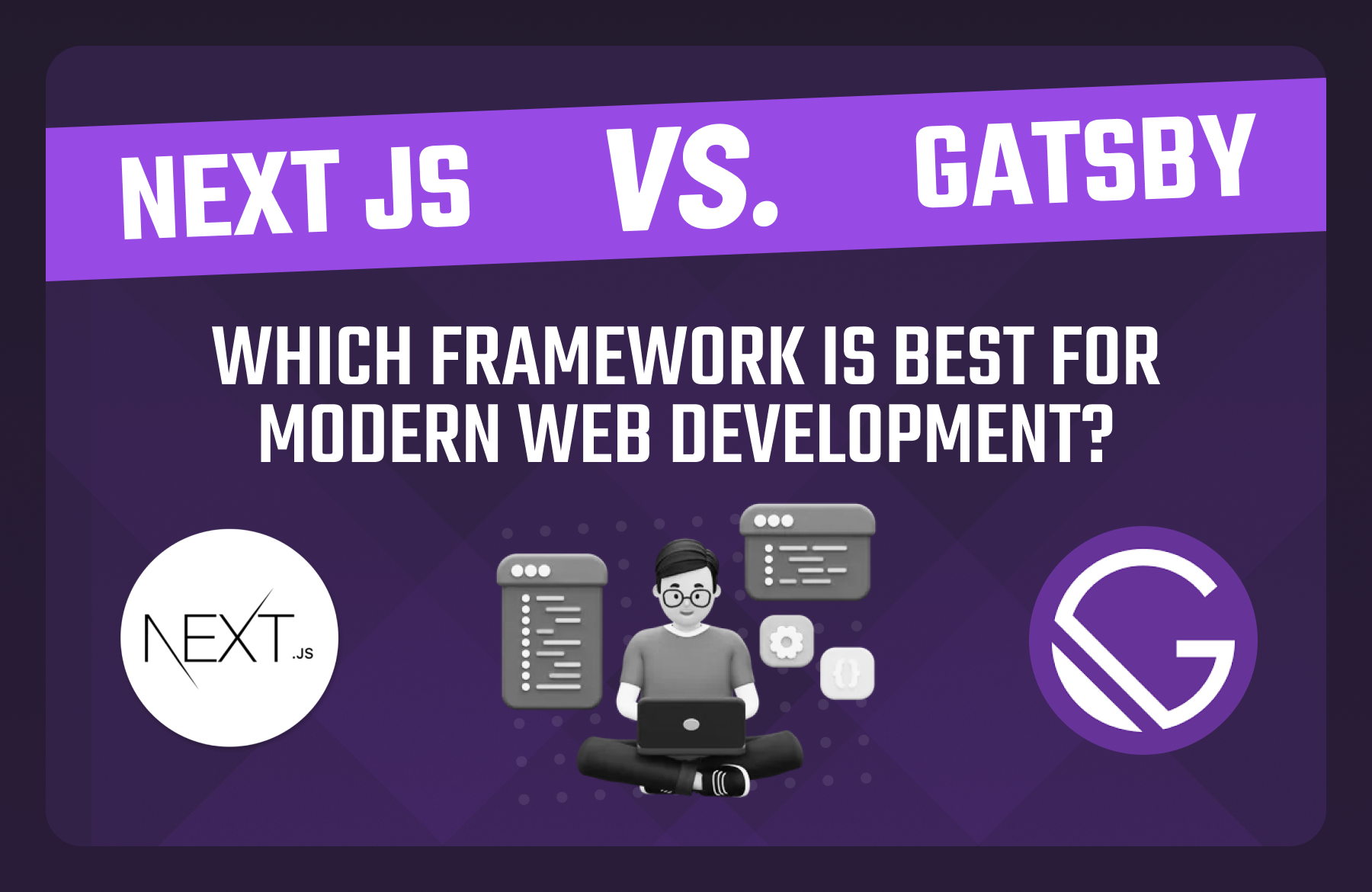During the last few years, technological advancements have impacted other fields of life, and the web development industry has also undergone significant changes. An effective online presence is important for every business to succeed in the online market. Therefore, developers are more concerned about creating websites that are agile, user-friendly and perform well.
Different tools are used to create sites in the modern web industry. Which one to choose, Next.js vs. Gatsby, is often asked by many people, as these two are the most prominent names when we think of building a website or a web app. Both of these frameworks have been built on React. It is a popular JavaScript library that is used to create well-performing, user-friendly websites.
Next.js vs. Gatsby has various similarities and differences. The selection of tools depends on what the project requires. Before choosing a framework for your project, you need to fully understand how each framework operates to select the correct one. This guide will assist you in making your decision when you cannot determine which framework suits your requirements best. Let's first start with what these two frameworks are.
Contents
- 1 What is the Next.js Framework?
- 1.1 What is the Gatsby Framework?
- 1.2 When to Choose Next.js Framework?
- 1.3 When to Choose Gatsby Framework?
- 1.4 Pros and Cons of Next.js Framework
- 1.5 Pros and Cons of the Gatsby Framework
- 1.6 Next.js vs. Gatsby: Performance Comparison
- 1.7 Which Framework Fits Your Needs: Next.js or Gatsby?
- 1.7.1 Choosing the Right Framework
- 1.7.2 Performance and SEO Considerations
- 1.7.3 Scalability and Ecosystem
- 1.7.4 Gatsby and Next.js for E-commerce Development
- 1.7.5 How to Migrate Your Site from Gatsby to Next.js (or vice versa)
- 1.7.6 Migrating from Gatsby to Next.js
- 1.7.7 Migrating from Next.js to Gatsby
- 1.8 Comparison of SEO Capabilities
- 1.9 How GO-Globe Can Help You Choose the Right Framework
- 1.10 FAQs
What is the Next.js Framework?
Next.js is a versatile tool. It is built on React and is used to create all kinds of websites, static and dynamic. The comparison of Next.js vs. Gatsby shows that Next.js offers different rendering methods, and it is capable of generating pages on the server and can also pre-build them during the build process. It provides server-side rendering, static site rendering and incremental static regeneration. This makes it a favourable tool for creating all kinds of websites, especially ones that need real-time data.
For example, dashboards, blogs that require regular updation, or even large-scale eCommerce websites in Sharjah.
Next.js also provides built-in support for API routes. It means you can create backend functionality directly within the framework. Moreover, it offers various other benefits, including built-in SEO tools, image optimization and other enhanced performance features. It could be a great choice for those looking to create a flexible yet high-performing website.

What is the Gatsby Framework?
Gatsby converts your website into static HTML files, meaning the entire site is pre-built and ready to be displayed directly to visitors. Hence, Gatsby can be a good choice for those who want to build fast and efficient static sites.
Besides that, Gatsby can collect data from various sources. If you are using a headless Content Management System, Markdown files or APIs, Gatsby's GraphOL functionality helps combine this data smoothly and without any hassle. Because it creates full static websites, they load very quickly with no need for backend management. Moreover, there are no vulnerabilities or weaknesses that developers would need to worry about.
In addition to that, its built-in tools, such as image optimization, lazy loading and caching, make it a perfect choice because these features enhance the performance of the website and also improve user experience. For websites that are more focused on content, such as blogs or marketing pages, the comparison of Next JS vs. Gatsby JS indicates that Gatsby comes with an ideal combination of both speed and efficiency.
Next.js vs. Gatsby: Main Differences
Both frameworks have their strengths, but they cater to different needs. Let’s break down their core differences.
Flexibility vs. Speed
Next.js is all about flexibility when we look at Next.js vs. Gatsby. It lets you choose between static, server-side, or a mix of both. This means you can handle real-time data or build pages dynamically as users interact with your site.
For example, an e-commerce store with live inventory updates can benefit greatly from Next.js’s dynamic capabilities.
On the other hand, Gatsby is optimized for speed. It pre-builds static pages that can be served directly from a Content Delivery Network. This makes Gatsby incredibly fast, perfect for sites where speed and performance are critical, such as blogs or portfolios.
Dynamic vs. Static Content
Next.js supports dynamic content out of the box in the Next.js vs. Gatsby comparison. It’s well-suited for projects that involve personalized user experiences, real-time data updates, or authentication.
Gatsby, however, is best for static content. While you can make Gatsby sites dynamic with additional plugins or client-side logic, it’s not as straightforward as with Next.js. If your content doesn’t change frequently, Gatsby is a better option.
Build Times
The static nature of Gatsby can result in increased build times. It can increase even more for larger websites that consist of hundreds or thousands of pages. Because every page needs to be pre-built, the process can be exhausting and time-consuming.
Next.js doesn’t face this issue as much. With features like incremental static regeneration, it can update only specific pages, reducing build times significantly. This makes it more scalable for large projects.
Now you know the differences between these two frameworks, let’s explore when you should choose which tool fits the needs of your business.
When to Choose Next.js Framework?
Next.js is the right choice for projects that require:
- Dynamic Sites: Next.js is perfect for websites that need to show or update data in real time.
- Easy APIs: You can create backend APIs within your Next.js project, so you don’t need a separate server.
- Custom Page Loading: Next.js lets you choose how each page is rendered—server-side, pre-built, or updated occasionally—based on your needs.
- Complexity: Next.js is perfect for large-scale web apps like SaaS platforms, e-commerce stores, or dashboards.
- SEO optimization: Built-in tools help improve search engine rankings by rendering pages on the server for better crawlability.
When to Choose Gatsby Framework?
Gatsby is a great fit if you need:
- Blazing-fast performance: Gatsby’s static HTML files ensure rapid load times.
- Great for content websites: Gatsby is perfect for blogs, portfolios, and marketing sites.
- Works with headless CMS: It easily connects with tools like Contentful, WordPress, and Sanity.
- High security: Gatsby creates static files, so there’s no backend server for hackers to target.
- Cost-effective: Hosting static files on a Content Delivery Network is cheaper than running a backend server.
Before committing to a decision about tool selection between Next JS vs.Gatsby JS, understand which tools match your requirements, then evaluate their benefits alongside limitations.
Pros and Cons of Next.js Framework
Pros:
- Highly flexible with multiple rendering methods.
- Perfect for dynamic, real-time content.
- Includes backend functionality with API routes.
- Strong SEO and image optimization features.
- Scalable for large, complex applications.
Cons:
- More complex to set up for smaller projects.
- Requires a backend server for SSR, which can increase hosting costs.
- Steeper learning curve compared to Gatsby.
Pros and Cons of the Gatsby Framework
Pros:
- Lightning-fast performance due to static site generation.
- Wide range of plugins for easy integrations.
- Simplifies SEO with pre-rendered static pages.
- Secure and cost-effective for hosting.
- Great for smaller, content-heavy sites.
Cons:
- Longer build times for large sites.
- Limited support for dynamic content without additional tools.
- More effort is needed to add dynamic features.
Do these tools differ in performance, hosting, and SEO capabilities? Take a deeper look at the Next JS vs. Gatsby JS comparison.
Next.js vs. Gatsby: Performance Comparison
In terms of performance, Gatsby is hard to beat for static websites. By pre-building pages into static files it ensures quick loading times and high agility. Its reliance on CDNs also reduces latency, making it ideal for sites where speed is crucial.
However, for dynamic websites, Next.js is the better performer. Features like SSR and ISR ensure that pages are rendered quickly and efficiently, even with frequently updated content. If your site requires real-time data or personalized user experiences, Next.js outshines Gatsby.
Which Framework Fits Your Needs: Next.js or Gatsby?
Next.js is a React-based framework developed by Vercel, offering features like Server-Side Rendering (SSR), Static Site Generation (SSG), and Incremental Static Regeneration (ISR). It's designed for building dynamic applications with capabilities such as API routes and serverless functions.
Gatsby, on the other hand, is a static site generator that leverages React and GraphQL. It pre-builds pages at build time, optimizing them for performance and SEO. Gatsby excels in scenarios where content doesn't change frequently and can be fetched at build time.
Choosing the Right Framework
- Use Next.js if your project requires:
- Real-time data fetching
- API routes or serverless functions
- Frequent content updates
- Complex routing needs
- Use Gatsby if your project involves:
- Content-heavy static sites (e.g., blogs, documentation)
- Integration with various data sources via GraphQL
- Need for a rich plugin ecosystem
- Emphasis on performance and SEO out of the box
Performance and SEO Considerations
- Next.js provides flexibility with SSR and ISR, ensuring fast load times and SEO-friendly pages.
- Gatsby pre-builds static pages, delivering excellent performance and SEO optimization by default.
Scalability and Ecosystem
- Next.js supports both static and dynamic content, making it suitable for scalable applications.
- Gatsby offers a vast plugin ecosystem, facilitating easy integration with various CMSs and data sources.
Gatsby and Next.js for E-commerce Development
Next.js for E-commerce
Next.js is well-suited for building e-commerce platforms due to its:
- Server-Side Rendering (SSR): Ensures dynamic content like product availability and pricing is always up-to-date.
- API Routes: Allows seamless integration with payment gateways and user authentication systems.
- Incremental Static Regeneration (ISR): Enables static generation of product pages while allowing updates without rebuilding the entire site.
Gatsby for E-commerce
Gatsby can also be utilized for e-commerce, particularly for:
- Content-Driven Stores: Ideal for catalogues, blogs, and marketing pages.
- Static Product Pages: Pre-builds product pages for fast loading times.
- Integration with Headless CMSs: Works well with CMSs like Contentful, Shopify, and WordPress.
However, Gatsby may require additional configurations for handling dynamic aspects like user authentication and real-time inventory updates.
How to Migrate Your Site from Gatsby to Next.js (or vice versa)
Migrating from Gatsby to Next.js
- Set Up a New Next.js Project: Initialize a Next.js project using
create-next-app. - Transfer Static Pages: Move your static pages from Gatsby's
src/pagesto Next.js'spagesdirectory. - Update Routing: Replace Gatsby's
<Link>component with Next.js'snext/link. - Handle Data Fetching: Convert Gatsby's GraphQL queries to Next.js's
getStaticPropsorgetServerSideProps. - Reconfigure Plugins: Identify Gatsby plugins and find Next.js equivalents or implement custom solutions.
Migrating from Next.js to Gatsby
- Set Up a New Gatsby Project: Initialize a Gatsby project using
gatsby new. - Transfer Components and Pages: Move your React components and pages to Gatsby's structure.
- Adapt Routing: Replace Next.js
next/linkwith Gatsby's<Link>component. - Handle Data Fetching: Convert Next.js's data fetching methods to Gatsby's GraphQL queries.
- Reconfigure API Routes: Implement Gatsby functions or serverless functions to replace Next.js API routes.
Comparison of SEO Capabilities
SEO-friendly but Achieve it Differently:
Next.js enhances SEO through server-side rendering. By rendering pages on the server, it ensures that search engines can easily crawl and index your content. Dynamic meta tags and optimized images further boost performance. Gatsby, on the other hand, focuses on static SEO. Its pre-rendered pages load faster, improving search rankings. Gatsby also offers built-in tools for image optimization and metadata management.
Hosting and Agility Differences:
Next.js typically requires a backend server for Static server rendering, which may increase hosting costs. However, platforms like Vercel and Netlify make deployment easy. For larger applications, Next.js’s ability to handle dynamic content makes it more scalable.
Gatsby generates static files, which can be hosted directly on a Content Delivery Network. This is usually more cost-effective for smaller projects. Gatsby’s static structure makes it simple to scale without needing extra servers.
How GO-Globe Can Help You Choose the Right Framework
Best web development company in Dubai, GO-Globe, specializes in custom web development using Next.js vs. Gatsby. Whether you're building an e-commerce platform, a corporate website, or a dynamic web application, our team of experts can guide you in choosing the right framework for your business goals. We analyze your needs and recommend the best approach.
- Performance Optimization: Ensuring your site loads quickly and ranks well in search engines.
- Seamless Integrations: Whether it's CMS integration, API connections, or third-party tools.
- Scalable & Secure Websites: Building future-proof digital experiences.
FAQs
Is Gatsby better for SEO than Next.js?
Both frameworks offer excellent SEO capabilities. Gatsby pre-builds static pages, ensuring fast load times and optimal SEO. Next.js provides SSR and ISR, allowing for dynamic content while maintaining SEO performance.
Can Next.js handle static sites like Gatsby?
Yes, Next.js can handle static sites using its SSG capabilities. It offers flexibility by supporting both static and dynamic content.
What type of projects should I use Gatsby for?
Gatsby is ideal for content-heavy static sites, such as blogs, documentation, and marketing pages, where performance and SEO are priorities.
Which framework is faster: Next.js or Gatsby?
Gatsby often delivers faster initial load times due to its static nature. However, Next.js's ISR ensures that dynamic content is served efficiently without compromising performance.
How do Next.js and Gatsby compare in terms of security?
Both frameworks offer robust security features. Gatsby's static nature reduces server-side vulnerabilities, while Next.js provides features like API routes and serverless functions with built-in security measures.
















